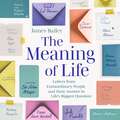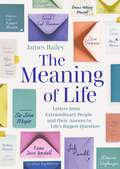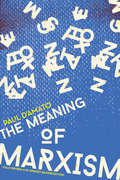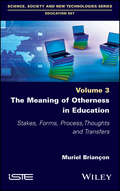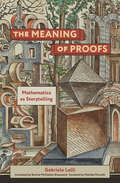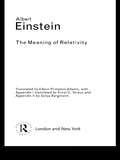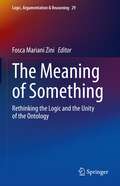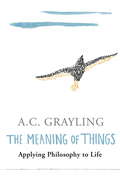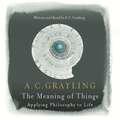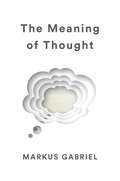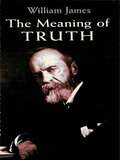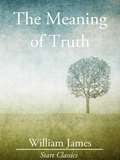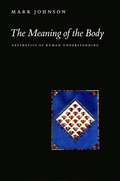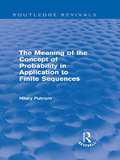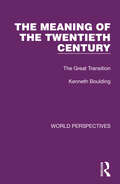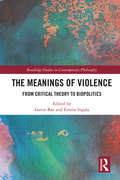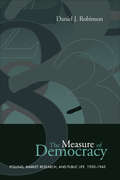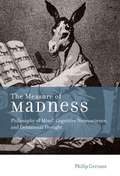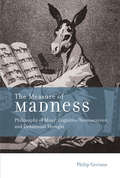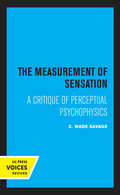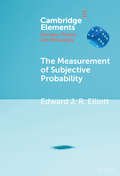- Table View
- List View
The Meaning of Life: Letters from Extraordinary People and their Answer to Life's Biggest Question
by James BaileyJames Bailey was unemployed, heartbroken, and questioning his purpose on the planet. In desperate search of an answer, he decided to write to luminaries from all fields and ask one simple question: What is the meaning of life? Then he waited. Slowly but surely their responses arrived through his letterbox. From entrepreneurs and environmentalists, to artists, authors and adventurers, this book gathers a kaleidoscope of perspectives on what it means to be human. With over one hundred enlightening responses, it's more than just a collection of letters; it's a roadmap to finding your own path. With letters from Dame Jane Goodall, Helen Sharman OBE, Bindi Irwin, Dr Astro Teller, Catherine Coleman Flowers, Lizzie Carr, Professor Jean Golding OBE, Professor Ian Frazer AC, Dr Michael Irwin, Professor Anil Seth, Sir Tim Smit KBE, Edward O. Wilson, Dr Mya-Rose Craig, Professor Lord Robert Winston, Bill McKibben, Henry Marsh CBE, Dr Kathryn Mannix, Dame Hilary Mantel, Julian Fellowes, Michael Frayn FRSL, Jodi Picoult, Anthony Horowitz CBE, Tony Wheeler, AO, Pico Iyer, Gayatri Chakravorty Spivak FBA, Amol Rajan, Sir Alan Ayckbourn, Simon Calder, Monica Heisey, Donna Ashworth, Gyles Brandreth, Danny Wallace, Rupi Kaur, Susan Pollack MBE, Martine Wright MBE, Simon Weston CBE, Mike Haines MBE, Natalie Queiroz MBE, Sir Terry Waite KCMG CBE, Chris Moon MBE, Matt Lewis, Brian Clark, John Hoskison, Benedict Allen, Tom Turcich, Ann Daniels, Dame Ellen Macarthur, Mark Beaumont BEM, Ben Smith, Yves Rossy, Jessica Watson, Fatima Whitbread MBE, Chris Eubank, Gail Muller, Sir Ranulph Fiennes, Bonita Norris, Alexander Campbell, David Smith MBE, Yusuf / Cat Stevens, Jesse Tyler Ferguson, Rachel Portman OBE, Sir Michael Eavis, Sananda Maitreya, Ruth Rogers CBE, Luke Jerram, Stefan Sagmeister, Tommy Cannon, The Connor Brothers, David Hurn, Max Fosh, Jonathan Goodwin, Joan Armatrading CBE, Sir John Major KG CH, President Jimmy Carter, Baroness Sayeeda Warsi, Bishop Guli, Dr Rowan Williams, Zara Mohammed, Rabbi David Rosen KSG CBE, Cardinal Cormac Murphy-O'Connor, Richard Reed, Claire Williams OBE, Dame Stephanie Shirley, Julie Bentley, Dave Fishwick, Dr Sarah Hughes, Richard Farleigh, Marvin Rees OBE, Jack Kornfield, Oliver Burkeman, Dr Sara Kuburic, Adam Grant, Celeste Headlee, Mark Manson, Beth Kempton, Cory Allen, Professor Peter Adamson, Melissa Sterry, Mark Stevenson, Joshua Fletcher, Gretchen Rubin, Charles Duhigg, Roxie Nafousi, Matt Ridley, and Charles Salvador.
The Meaning of Life: Letters from Extraordinary People and their Answer to Life's Biggest Question
by James BaileyJames Bailey was unemployed, heartbroken, and questioning his purpose on the planet. In desperate search of an answer, he decided to write to luminaries from all fields and ask one simple question: What is the meaning of life? Then he waited. Slowly but surely their responses arrived through his letterbox. From entrepreneurs and environmentalists, to artists, authors and adventurers, this book gathers a kaleidoscope of perspectives on what it means to be human. With over one hundred enlightening responses, it's more than just a collection of letters; it's a roadmap to finding your own path. With letters from Dame Jane Goodall, Helen Sharman OBE, Bindi Irwin, Dr Astro Teller, Catherine Coleman Flowers, Lizzie Carr, Professor Jean Golding OBE, Professor Ian Frazer AC, Dr Michael Irwin, Professor Anil Seth, Sir Tim Smit KBE, Edward O. Wilson, Dr Mya-Rose Craig, Professor Lord Robert Winston, Bill McKibben, Henry Marsh CBE, Dr Kathryn Mannix, Dame Hilary Mantel, Julian Fellowes, Michael Frayn FRSL, Jodi Picoult, Anthony Horowitz CBE, Tony Wheeler, AO, Pico Iyer, Gayatri Chakravorty Spivak FBA, Amol Rajan, Sir Alan Ayckbourn, Simon Calder, Monica Heisey, Donna Ashworth, Gyles Brandreth, Danny Wallace, Rupi Kaur, Susan Pollack MBE, Martine Wright MBE, Simon Weston CBE, Mike Haines MBE, Natalie Queiroz MBE, Sir Terry Waite KCMG CBE, Chris Moon MBE, Matt Lewis, Brian Clark, John Hoskison, Benedict Allen, Tom Turcich, Ann Daniels, Dame Ellen Macarthur, Mark Beaumont BEM, Ben Smith, Yves Rossy, Jessica Watson, Fatima Whitbread MBE, Chris Eubank, Gail Muller, Sir Ranulph Fiennes, Bonita Norris, Alexander Campbell, David Smith MBE, Yusuf / Cat Stevens, Jesse Tyler Ferguson, Rachel Portman OBE, Sir Michael Eavis, Sananda Maitreya, Ruth Rogers CBE, Luke Jerram, Stefan Sagmeister, Tommy Cannon, The Connor Brothers, David Hurn, Max Fosh, Jonathan Goodwin, Joan Armatrading CBE, Sir John Major KG CH, President Jimmy Carter, Baroness Sayeeda Warsi, Bishop Guli, Dr Rowan Williams, Zara Mohammed, Rabbi David Rosen KSG CBE, Cardinal Cormac Murphy-O'Connor, Richard Reed, Claire Williams OBE, Dame Stephanie Shirley, Julie Bentley, Dave Fishwick, Dr Sarah Hughes, Richard Farleigh, Marvin Rees OBE, Jack Kornfield, Oliver Burkeman, Dr Sara Kuburic, Adam Grant, Celeste Headlee, Mark Manson, Beth Kempton, Cory Allen, Professor Peter Adamson, Melissa Sterry, Mark Stevenson, Joshua Fletcher, Gretchen Rubin, Charles Duhigg, Roxie Nafousi, Matt Ridley, and Charles Salvador.
The Meaning of Life: Letters from Extraordinary People and their Answer to Life's Biggest Question
by James BaileyJames Bailey was unemployed, heartbroken, and questioning his purpose on the planet. In desperate search of an answer, he decided to write to luminaries from all fields and ask one simple question: What is the meaning of life? Then he waited. Slowly but surely their responses arrived through his letterbox. From entrepreneurs and environmentalists, to artists, authors and adventurers, this book gathers a kaleidoscope of perspectives on what it means to be human. With over one hundred enlightening responses, it's more than just a collection of letters; it's a roadmap to finding your own path. With letters from Dame Jane Goodall, Helen Sharman OBE, Bindi Irwin, Dr Astro Teller, Catherine Coleman Flowers, Lizzie Carr, Professor Jean Golding OBE, Professor Ian Frazer AC, Dr Michael Irwin, Professor Anil Seth, Sir Tim Smit KBE, Edward O. Wilson, Dr Mya-Rose Craig, Professor Lord Robert Winston, Bill McKibben, Henry Marsh CBE, Dr Kathryn Mannix, Dame Hilary Mantel, Julian Fellowes, Michael Frayn FRSL, Jodi Picoult, Anthony Horowitz CBE, Tony Wheeler, AO, Pico Iyer, Gayatri Chakravorty Spivak FBA, Amol Rajan, Sir Alan Ayckbourn, Simon Calder, Monica Heisey, Donna Ashworth, Gyles Brandreth, Danny Wallace, Rupi Kaur, Susan Pollack MBE, Martine Wright MBE, Simon Weston CBE, Mike Haines MBE, Natalie Queiroz MBE, Sir Terry Waite KCMG CBE, Chris Moon MBE, Matt Lewis, Brian Clark, John Hoskison, Benedict Allen, Tom Turcich, Ann Daniels, Dame Ellen Macarthur, Mark Beaumont BEM, Ben Smith, Yves Rossy, Jessica Watson, Fatima Whitbread MBE, Chris Eubank, Gail Muller, Sir Ranulph Fiennes, Bonita Norris, Alexander Campbell, David Smith MBE, Yusuf / Cat Stevens, Jesse Tyler Ferguson, Rachel Portman OBE, Sir Michael Eavis, Sananda Maitreya, Ruth Rogers CBE, Luke Jerram, Stefan Sagmeister, Tommy Cannon, The Connor Brothers, David Hurn, Max Fosh, Jonathan Goodwin, Joan Armatrading CBE, Sir John Major KG CH, President Jimmy Carter, Baroness Sayeeda Warsi, Bishop Guli, Dr Rowan Williams, Zara Mohammed, Rabbi David Rosen KSG CBE, Cardinal Cormac Murphy-O'Connor, Richard Reed, Claire Williams OBE, Dame Stephanie Shirley, Julie Bentley, Dave Fishwick, Dr Sarah Hughes, Richard Farleigh, Marvin Rees OBE, Jack Kornfield, Oliver Burkeman, Dr Sara Kuburic, Adam Grant, Celeste Headlee, Mark Manson, Beth Kempton, Cory Allen, Professor Peter Adamson, Melissa Sterry, Mark Stevenson, Joshua Fletcher, Gretchen Rubin, Charles Duhigg, Roxie Nafousi, Matt Ridley, and Charles Salvador.
The Meaning of Marxism
by Paul D'Amato"In [D'Amato's] able hands, Marxist politics come alive and leap before us, pointing a way toward a better world. It's a knockout."--Dave Zirin, author of What's My Name, Fool?: Sports and Resistance in the United StatesIn this lively and accessible introduction to the ideas of Karl Marx, with historical and contemporary examples, D'Amato argues that Marx's ideas of globalization, oppression, and social change are more important than ever.Paul D'Amato is the associate editor of the International Socialist Review. His writing has appeared in CounterPunch, Socialist Worker, and SelvesandOthers.org. He is an activist based in Chicago.
The Meaning of Otherness in Education: Stakes, Forms, Process, Thoughts and Transfers
by Muriel BriançonThe notion of otherness, often misused, requires important conceptualization work in order for it to be considered in all of its forms, and not simply reduced to the account of others. Although otherness certainly questions the link to the other (relation), it also questions the link to the self (reflexivity) and the link to knowledge (epistemology). Being tridimensional, the process of otherness is a paradox, the meaning of which can only be drawn thanks to ethics, psychoanalytical orientation and the history of philosophical ideas. This book, which relates to philosophy of education, seeks to explain the problematic notion of otherness, the desire for which is specific to humankind. It examines how otherness questions the limits of knowledge, transmission and language, and argues that it is in fact a value, a tool and practice for all the actors involved in the relationship between education, knowledge and care.
The Meaning of Proofs: Mathematics as Storytelling
by Gabriele LolliWhy mathematics is not merely formulaic: an argument that to write a mathematical proof is tantamount to inventing a story.In The Meaning of Proofs, mathematician Gabriele Lolli argues that to write a mathematical proof is tantamount to inventing a story. Lolli offers not instructions for how to write mathematical proofs, but a philosophical and poetic reflection on mathematical proofs as narrative. Mathematics, imprisoned within its symbols and images, Lolli writes, says nothing if its meaning is not narrated in a story. The minute mathematicians open their mouths to explain something—the meaning of x, how to find y—they are framing a narrative. Every proof is the story of an adventure, writes Lolli, a journey into an unknown land to open a new, connected route; once the road is open, we correct it, expand it. Just as fairy tales offer a narrative structure in which new characters can be inserted into recurring forms of the genre in original ways, in mathematics, each new abstract concept is the protagonist of a different theory supported by the general techniques of mathematical reasoning. In ancient Greece, there was more than an analogy between literature and mathematics, there was direct influence. Euclid&’s proofs have roots in poetry and rhetoric. Mathematics, Lolli asserts, is not the mere manipulation of formulas.
The Meaning of Relativity
by Albert EinsteinThe world would be a very different place if it were not for Albert Einstein. Like Newton and Galileo before him, this remarkable scientist changed forever mankind's understanding of the universe. In 1921, five years after proclaiming his general theory of relativity, Einstein was awarded the Nobel Prize for Physics in recognition of his remarkable achievements. In the same year he travelled to the United States to give four lectures that consolidated his theory and sought to explain its meaning to a new audience. These lectures were published the following year as The Meaning of Relativity, which he revised with each new edition until his death. It remains a key work for anyone wishing to discover at first hand the workings of one of the most inspiring minds of the twentieth century.
The Meaning of Something: Rethinking the Logic and the Unity of the Ontology (Logic, Argumentation & Reasoning #29)
by Fosca Mariani ZiniThis innovative volume investigates the meaning of ‘something’ in different recent philosophical traditions in order to rethink the logic and the unity of ontology, without forgetting to compare these views to earlier significative accounts in the history of philosophy. In fact, the revival of interest in “something” in the 19th and 20th centuries as well as in contemporary philosophy can easily be accounted for: it affords the possibility for asking the question: what is there? without engaging in predefined speculative assumptions The issue about “something” seems to avoid any naive approach to the question about what there is, so that it is treated in two main contemporary philosophical trends: “material ontology”, which aims at taking “inventory” of what there is, of everything that is; and “formal ontology”, which analyses the structural features of all there is, whatever it is. The volume advances cutting-edge debates on what is the first et the most general item in ontology, that is to say “something”, because the relevant features of the conceptual core of something are: non-nothingness, otherness. Something means that one being is different from others. The relationality belongs to something.: Therefore, the volume advances cutting-edge debates in phenomenology, analytic philosophy, formal and material ontology, traditional metaphysics.
The Meaning of Suffering and Strife and Reconciliation (The Spiritual writings of Archimandrite Seraphi Aleksiev #Vol. II & III)
by Ralitsa DoynovaAlong with the current lack of belief and faith in God, truly the most piteous of all suffering is the lack of repentance--and therefore the lack of love. Repentance leads to the gateway of heaven and not only alleviates the anguish of suffering but actually transforms this suffering into the intense joy of being reunited with out Lord Jesus Christ.
The Meaning of Things: Applying Philosophy to life
by A.C. GraylingA refreshing distillation of insights into the human condition, by one of the best-known and most popular philosophers in the UK.Thinking about life, what it means and what it holds in store does not have to be a despondent experience, but rather can be enlightening and uplifting. A life truly worth living is one that is informed and considered so a degree of philosophical insight into the inevitabilities of the human condition is inherently important and such an approach will help us to deal with real personal dilemmas.This book is an accessible, lively and thought-provoking series of linked commentaries, based on A. C. Grayling's 'The Last Word' column in the GUARDIAN. Its aim is not to persuade readers to accept one particular philosophical point of view or theory, but to help us consider the wonderful range of insights which can be drawn from an immeasurably rich history of philosophical thought.Concepts covered include courage, love, betrayal, ambition, cruelty, wisdom, passion, beauty and death. This will be a wonderfully stimulating read and act as an invaluable guide as to what is truly important in living life, whether facing success, failure, justice, wrong, love, loss or any of the other profound experience life throws out.
The Meaning of Things: Applying Philosophy to life
by Prof A.C. GraylingA refreshing distillation of insights into the human condition, by one of the best-known and most popular philosophers in the UK.Thinking about life, what it means and what it holds in store does not have to be a despondent experience, but rather can be enlightening and uplifting. A life truly worth living is one that is informed and considered so a degree of philosophical insight into the inevitabilities of the human condition is inherently important and such an approach will help us to deal with real personal dilemmas.This book is an accessible, lively and thought-provoking series of linked commentaries, based on A. C. Grayling's 'The Last Word' column in the GUARDIAN. Its aim is not to persuade readers to accept one particular philosophical point of view or theory, but to help us consider the wonderful range of insights which can be drawn from an immeasurably rich history of philosophical thought.Concepts covered include courage, love, betrayal, ambition, cruelty, wisdom, passion, beauty and death. This will be a wonderfully stimulating read and act as an invaluable guide as to what is truly important in living life, whether facing success, failure, justice, wrong, love, loss or any of the other profound experience life throws out.
The Meaning of Things: Applying Philosophy to life
by Prof A.C. GraylingThinking about life, what it means and what it holds in store does not have to be a despondent experience, but rather can be enlightening and uplifting. A life truly worth living is one that is informed and considered so a degree of philosophical insight into the inevitabilities of the human condition is inherently important and such an approach will help us to deal with real personal dilemmas.This book is an accessible, lively and thought-provoking series of linked commentaries, based on A.C Grayling's 'The Last Word' column in the Guardian. Its aim is not to persuade readers to accept one particular philosophical point of view or theory, but to help us consider the wonderful range of insights which can be drawn from an immeasurably rich history of philosophical thought.Read by AC Grayling(p) 2005 Orion Publishing Group
The Meaning of Thought
by Markus GabrielFrom populist propaganda attacking knowledge as ‘fake news’ to the latest advances in artificial intelligence, human thought is under unprecedented attack today. If computers can do what humans can do and they can do it much faster, what’s so special about human thought? In this new book, bestselling philosopher Markus Gabriel steps back from the polemics to re-examine the very nature of human thought. He conceives of human thinking as a ‘sixth sense’, a kind of sense organ that is closely tied our biological reality as human beings. Our thinking is not a form of data processing but rather the linking together of images and imaginary ideas which we process in different sensory modalities. Our time frame expands far beyond the present moment, as our ideas and beliefs stretch far beyond the here and now. We are living beings and the whole of evolution is built into our life story. In contrast to some of the exaggerated claims made by proponents of AI, Gabriel argues that our thinking is a complex structure and organic process that is not easily replicated and very far from being superseded by computers. With his usual wit and intellectual verve, Gabriel combines philosophical insight with pop culture to set out a bold defence of the human and a plea for an enlightened humanism for the 21st century. This timely book will be of great value to anyone interested in the nature of human thought and the relations between human beings and machines in an age of rapid technological change.
The Meaning of Truth
by William JamesThe work of a leading figure in the transition from a predominantly European-centered 19th-century philosophy to a new American philosophy, this volume presents a full and definitive expression of the pragmatist epistemology. It encompasses everything James had hitherto written on the theory of knowledge, including later polemic and expository contributions, and replies to previous criticism.
The Meaning of Truth
by William JamesThe Meaning of Truth is one of William James' most important books. It is a necessary read for anyone looking to understand the nature of truth. Does it exist independently of man or does man make truth what it is? Here you will find answers to this and many other questions on the nature of truth. William James was the older brother of novelist Henry James, and a pioneering psychologist and philosopher. His works pushed the boundaries of psychology and helped shape the direction the field would grow in.
The Meaning of the Body: Aesthetics of Human Understanding
by Mark JohnsonThe belief that the mind and the body are separate and that the mind is the source of all meaning has been a part of Western culture for centuries. Both philosophers and scientists have questioned this dualism, but their efforts have rarely converged. Many philosophers continue to rely on disembodied models of human thought, while scientists tend to reduce the complex process of thinking to a merely physical phenomenon. In The Meaning of the Body, Mark Johnson continues his pioneering work on the exciting connections between cognitive science, language, and meaning first begun in the classic Metaphors We Live By. Johnson uses recent research into infant psychology to show how the body generates meaning even before self-consciousness has fully developed. From there he turns to cognitive neuroscience to further explore the bodily origins of meaning, thought, and language and examines the many dimensions of meaning--including images, qualities, emotions, and metaphors--that are all rooted in the body's physical encounters with the world. Drawing on the psychology of art and pragmatist philosophy, Johnson argues that all of these aspects of meaning-making are fundamentally aesthetic. Thus the arts are the culmination of human attempts to find meaning and studying the aesthetic dimensions of our experience is crucial to unlocking the bodily sources of meaning. Brilliantly synthesizing a broad range of scientific research and philosophical inquiry in clear and original writing, Mark Johnson's The Meaning of the Body puts forth a bold new conception of the mind rooted in the understanding that philosophy will matter to non philosophers only if it is built on a visceral connection to the world.
The Meaning of the Body: Aesthetics of Human Understanding
by Mark JohnsonIn The Meaning of the Body, Mark Johnson continues his pioneering work on the exciting connections between cognitive science, language, and meaning first begun in the classic Metaphors We Live By. Johnson uses recent research into infant psychology to show how the body generates meaning even before self-consciousness has fully developed. From there he turns to cognitive neuroscience to further explore the bodily origins of meaning, thought, and language and examines the many dimensions of meaning—including images, qualities, emotions, and metaphors—that are all rooted in the body’s physical encounters with the world. Drawing on the psychology of art and pragmatist philosophy, Johnson argues that all of these aspects of meaning-making are fundamentally aesthetic. He concludes that the arts are the culmination of human attempts to find meaning and that studying the aesthetic dimensions of our experience is crucial to unlocking meaning's bodily sources. Throughout, Johnson puts forth a bold new conception of the mind rooted in the understanding that philosophy will matter to nonphilosophers only if it is built on a visceral connection to the world. “Mark Johnson demonstrates that the aesthetic and emotional aspects of meaning are fundamental—central to conceptual meaning and reason, and that the arts show meaning-making in its fullest realization. If you were raised with the idea that art and emotion were external to ideas and reason, you must read this book. It grounds philosophy in our most visceral experience.”—George Lakoff, author of Moral Politics
The Meaning of the Concept of Probability in Application to Finite Sequences (Routledge Revivals)
by Hilary PutnamFirst published in 1990, this is a reissue of Professor Hilary Putnam’s dissertation thesis, written in 1951, which concerns itself with The Meaning of the Concept of Probability in Application to Finite Sequences and the problems of the deductive justification for induction. Written under the direction of Putnam’s mentor, Hans Reichenbach, the book considers Reichenbach’s idealization of very long finite sequences as infinite sequences and the bearing this has upon Reichenbach’s pragmatic vindication of induction.
The Meaning of the Twentieth Century: The Great Transition (World Perspectives #2)
by Kenneth BouldingOriginally published in 1965 and written by a noted economist and leader in the field of conflict resolution, this book traces the forces which have brought the 20th century ‘post-civilisation’ into being: the ever-increasing power of science and the scientific attitude, the global communication network, the high efficiency of industrial societies. New conditions pointed to a life of ease but also enormous problems. The book discusses how though our technical resources have become immense, social and psychological conflicts remain. The author’s training in psychology and economics combines with a deep sense of history to create a book which is as relevant now as when it was first published.
The Meanings of Violence: From Critical Theory to Biopolitics (Routledge Studies in Contemporary Philosophy)
by Gavin Rae Emma IngalaViolence has long been noted to be a fundamental aspect of the human condition. Traditionally, however, philosophical discussions have tended to approach it through the lens of warfare and/or limit it to physical forms. This changed in the twentieth century as the nature and meaning of ‘violence’ itself became a conceptual problem. Guided by the contention that Walter Benjamin’s famous 1921 ‘Critique of Violence’ essay inaugurated this turn to an explicit questioning of violence, this collection brings together an international array of scholars to engage with how subsequent thinkers—Agamben, Arendt, Benjamin, Butler, Castoriadis, Derrida, Fanon, Gramsci, Merleau-Ponty, Sartre, and Schmitt—grappled with the meaning and place of violence. The aim is not to reduce these multiple responses to a singular one, but to highlight the heterogeneous ways in which the concept has been inquired into and the manifold meanings of it that have resulted. To this end, each chapter focuses on a different approach or thinker within twentieth and twenty-first century European philosophy, with many of them tackling the issue through the mediation of other topics and disciplines, including biopolitics, epistemology, ethics, culture, law, politics, and psychoanalysis. As such, the volume will be an invaluable resource for those interested in Critical Theory, Cultural Studies, History of Ideas, Philosophy, Politics, Political Theory, Psychology, and Sociology.
The Measure of Democracy: Polling, Market Research, and Public Life, 1930-1945
by Daniel RobinsonPoliticians, government officials, and public relations officers lean heavily on polling when fashioning public policy. Proponents say this is for the best, arguing that surveys bring the views of citizens closer to civic officials. Critics decry polling's promotion of sycophantic politicians who pander to the whims of public sentiment, or, conversely, the use of surveys by special interest groups to thwart the majority will. Similar claims and criticisms were made during the early days of polling. When George Gallup began polling Americans in 1935, he heralded it as a bold step in popular democracy. The views of ordinary citizens could now be heard alongside those of organized interest groups. When brought to Canada in 1941, the Gallup Poll promised similar democratic rejuvenation. In actual practice, traditionally disadvantaged constituencies such as women, the poor, French Canadians, and African Americans were often heavily underrepresented in Gallup surveys. Preoccupied with election forecasting, Gallup pollsters undercounted social groups thought less likely or unable to vote, leading to a considerable gap between the polling results of the sampled polity and the opinions of the general public. Examining the origins and early years of public opinion polling in Canada, Robinson situates polling within the larger context of its forerunners – market research surveys and American opinion polling – and charts its growth until its first uses by political parties.
The Measure of Madness
by Philip GerransIn The Measure of Madness, Philip Gerrans offers a novel explanation of delusion. Over the last two decades, philosophers and cognitive scientists have investigated explanations of delusion that interweave philosophical questions about the nature of belief and rationality with findings from cognitive science and neurobiology. Gerrans argues that once we fully describe the computational and neural mechanisms that produce delusion and the way in which conscious experience and thought depend on them, the concept of delusional belief retains only a heuristic role in the explanation of delusion.Gerrans proposes that delusions are narrative models that accommodate anomalous experiences. He argues that delusions represent the operation of the Default Mode Network (DMN) -- the cognitive system that provides the raw material for humans' inbuilt tendency to provide a subjectively compelling narrative context for anomalous or highly salient experiences -- without the "supervision" of higher cognitive processes present in the nondelusional mind. This explanation illuminates the relationship among delusions, dreams, imaginative states, and irrational beliefs that have perplexed philosophers and psychologists for over a century. Going beyond the purely conceptual and the phenomenological, Gerrans brings together findings from different disciplines to trace the flow of information through the cognitive system, and applies these to case studies of typical schizophrenic delusions: misidentification, alien control, and thought insertion. Drawing on the interventionist model of causal explanation in philosophy of science and the predictive coding approach to the mind influential in computational neuroscience, Gerrans provides a model for integrative theorizing about the mind.
The Measure of Madness: Philosophy of Mind, Cognitive Neuroscience, and Delusional Thought (Life and Mind: Philosophical Issues in Biology and Psychology)
by Philip GerransDrawing on the latest work in cognitive neuroscience, a philosopher proposes that delusions are narrative models that accommodate anomalous experiences.In The Measure of Madness, Philip Gerrans offers a novel explanation of delusion. Over the last two decades, philosophers and cognitive scientists have investigated explanations of delusion that interweave philosophical questions about the nature of belief and rationality with findings from cognitive science and neurobiology. Gerrans argues that once we fully describe the computational and neural mechanisms that produce delusion and the way in which conscious experience and thought depend on them, the concept of delusional belief retains only a heuristic role in the explanation of delusion.Gerrans proposes that delusions are narrative models that accommodate anomalous experiences. He argues that delusions represent the operation of the Default Mode Network (DMN)—the cognitive system that provides the raw material for humans' inbuilt tendency to provide a subjectively compelling narrative context for anomalous or highly salient experiences—without the “supervision” of higher cognitive processes present in the nondelusional mind. This explanation illuminates the relationship among delusions, dreams, imaginative states, and irrational beliefs that have perplexed philosophers and psychologists for over a century.Going beyond the purely conceptual and the phenomenological, Gerrans brings together findings from different disciplines to trace the flow of information through the cognitive system, and applies these to case studies of typical schizophrenic delusions: misidentification, alien control, and thought insertion. Drawing on the interventionist model of causal explanation in philosophy of science and the predictive coding approach to the mind influential in computational neuroscience, Gerrans provides a model for integrative theorizing about the mind.
The Measurement of Sensation: A Critique of Perceptual Psychophysics
by C. Wade SavageThis title is part of UC Press's Voices Revived program, which commemorates University of California Press’s mission to seek out and cultivate the brightest minds and give them voice, reach, and impact. Drawing on a backlist dating to 1893, Voices Revived makes high-quality, peer-reviewed scholarship accessible once again using print-on-demand technology. This title was originally published in 1970.
The Measurement of Subjective Probability (Elements in Decision Theory and Philosophy)
by Edward J. ElliottBeliefs come in degrees, and we often represent those degrees with numbers. We might say, for example, that we are 90% confident in the truth of some scientific hypothesis, or only 30% confident in the success of some risky endeavour. But what do these numbers mean? What, in other words, is the underlying psychological reality to which the numbers correspond? And what constitutes a meaningful difference between numerically distinct representations of belief? In this Element, we discuss the main approaches to the measurement of belief. These fall into two broad categories-epistemic and decision-theoretic-with divergent foundations in the theory of measurement. Epistemic approaches explain the measurement of belief by appeal to relations between belief states themselves, whereas decision-theoretic approaches appeal to relations between beliefs and desires in the production of choice and preferences.
